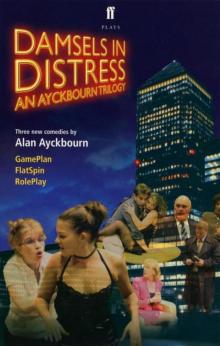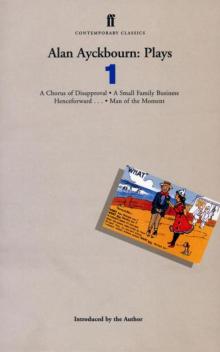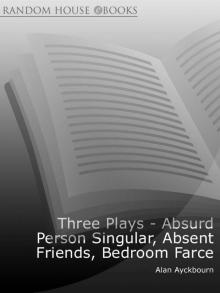- Home
- Alan Ayckbourn
Alan Ayckbourn Plays 1
Alan Ayckbourn Plays 1 Read online
ALAN AYCKBOURN
Plays One
A Chorus of Disapproval
A Small Family Business
Henceforward …
Man of the Moment
Introduced by
the Author
Contents
Title Page
Introduction
A Chorus of Disapproval
Characters
Note on the Action
First Performance
Act One
Act Two
A Small Family Business
Characters
Note
Note on the Action
First Performance
Act One
Act Two
Henceforward …
Characters
Note on the Timing
First Performance
Notes on the Music
Act One
Scene One
Scene Two
Act Two
Man of the Moment
Characters
Note on the Action
First Performance
Act One
Act Two
About the Author
By the Same Author
Copyright
Introduction
I suppose what immediately links these plays is that they were written within a four-year period (1984–87) and could be loosely described as belonging to my ‘social’ period.
That is to say, they all deal with Society, capital S, in contrast to some of my earlier domestic pieces where human activity tended to revolve around the sexual tensions of the dining table or the three-piece suite. Even Henceforward … in its claustrophobic way is light years apart from the family familiarity of, say, The Norman Conquests.
A Chorus of Disapproval had a curious start. I wanted to write a play about an operatic society, heaven knows why. My first idea was to pen something for a large cast, using professional principals and a supporting cast of dozens of amateur singers. The latter would be seated in the auditorium, to all appearance like members of the audience, but they would from time to time during the action stand up and sing some linking comment or other like an operatic Greek chorus. I planned to base the play around a presumed production of The Vagabond King. I had read the libretto and I confess it amused me no end, particularly its choreographic stage directions.
Several things conspired to thwart the original idea. The Rudolph Friml Estate, fearing for their play, refused to release the rights. For which I didn’t blame them one bit. Simultaneously, those members of the local Scarborough Operatic Society whom I had approached seemed reluctant to accept anything but leading roles, for which I didn’t blame them either; and finally Equity, the Professional Actors’ Trade Union, declared the whole idea of including amateurs in this way unacceptable. Which forced me into swift solutions, all of them, it transpired, blessings in disguise.
First I decided to work with an entirely professional company and thus with a much smaller cast; sensible and far more economic. Secondly, to avoid further copyright problems, I found an author who had been dead so long that he and his relatives no longer cared. Which led me to a musical play I greatly admired and had always wanted to produce, Gay’s The Beggar’s Opera. Which in turn provided the missing piece to the whole venture. Gay’s play had a plot which echoed almost perfectly the one I intended to write and provided the perfect mirror image on which to build my own dramatic structure.
Moral: always work with something you admire and not with something which you only set out to make fun of. That way you might even manage to raise your game rather than lower it.
A Small Family Business, written in 1986, was unusual in that it was the first play for over twenty years which I had to submit and await someone else’s verdict as to whether it merited production.
Sir Peter Hall, who had introduced me to the National Theatre in 1977 with Bedroom Farce, had been an occasional producer of my plays on the South Bank ever since (including A Chorus of Disapproval). In 1985, Peter asked me if I’d like to take a break from Scarborough and come and run my own company at the National. My brief was to direct three plays over a two-year period, one in the conventional proscenium-arched Lyttelton, another in the large open-staged Olivier and a third on the smaller-scale, flexible Cottesloe stage. The only condition was that the one in the Olivier must be a new one of my own. I would have choice of the other two plays and be able to hand-pick my own acting company of twenty. The prospect of playing with such large toys proved irresistible.
I knew the Olivier of old. Not the friendliest of spaces for those purveyors of modern low-key naturalistic drama. ‘For love scenes you stand six feet apart and shout at each other,’ Michael Bryant, that most experienced of Olivier performers once advised me. ‘All other scenes you stand twenty feet apart and yell.’
In the end, the solution I came up with was a variation of the one I first used with my first play in the Lyttelton, Bedroom Farce. Namely, if you can’t find anything big enough to fill the space, then divide the space. With A Small Family Business I found the perfect excuse to put on stage something that had always been till then beyond my wildest budget, namely a two-storey house complete with working kitchen and bathroom. The biggest dolls’ house in the world. Peter described the piece as a modern morality play. He said it reminded him of Ben Jonson. I later read some Ben Jonson but I must confess I didn’t understand much of it. Still, I was very flattered.
While I was waiting a year to direct that (the National always need things so far in advance) I wrote Henceforward … This combined two or three of my interests at the time. It’s a play about the creative process: always difficult to portray on stage and rarely that convincing. Actors sitting pretending to be novelists, scratching away fiercely with quill pens whilst declaiming their prose aloud at twice the speed they are supposedly writing – Wuthering Heights in five days. It never makes good theatre. Nor do classical composers humming or painters holding up one thumb and squinting, and as for poets … But a modern composer, that was a different matter, especially one who worked entirely electronically with pre-sampled and generated sound. The result there could be, with only the smallest dramatic licence, quite immediate.
Henceforward … is on the surface a comedy but it does present a gloomy prediction of a possible future world where society, maybe as a direct result of the behaviour portrayed in A Small Family Business, has all but collapsed. And I suppose any play in which the hero allows his wife and daughter to die whilst he finishes writing his latest composition can’t be considered all funny. (I wonder where I got this reputation for being a comic dramatist.)
Jerome, the composer, was based on someone whom I met briefly one Christmas: an art historian who chose to live, or rather to remain living, in one of the bleaker of our Northern inner-city no-go zones. Alone on the top floor of his vandalized and abandoned tower block he sat writing, surrounded by the sounds, the images and the beauty of Renaissance music and art. ‘Why do you stay there?’ I asked him. His answer was quite chilling. ‘I feel’, he said, ‘that if I go, then the light might finally go out completely.’ The idea that each of us has a duty to provide illumination, as it were, in order that others might see more clearly is an image that has remained with me.
Henceforward … also provided me with the opportunity to indulge my love of robots. In particular the British (sorry-about-that-mate-we’re-still-waiting-for-the-part) sort of robot: totally eccentric, idiosyncratic, unserviceable and unreliable.
Finally, in Man of the Moment, written in 1988, I turned my attention to the nature of celebrity and fame, particularly with regard to television. Based on the unoriginal but eternally true observation that good news is no n
ews and bad news is good news, I reflected on the question of why it is that the camera can often make the really good appear dull whilst transforming villains into instant sources of fascination and attraction. The answer is, of course, that whereas it doesn’t tell flat lies, the camera often tells less than the whole truth. And to make it work for us we master techniques and tricks, all those skills which come naturally to the manipulators, the dissemblers and the con men but which are often beyond the capability of the earnest, the decent and the sincerely honest.
Driving each day to the National whilst rehearsing Man of the Moment, I passed posters for the film Buster, celebrating the life and crimes of one of the Great Train Robbers. It occurred to me then that the forgotten man in that media-celebrated event was the train driver himself who subsequently died of his injuries. Who would make the film about him? It was a small journey from there to the staged reunion between Douglas Beechey, the have-a-go bank clerk and the successful media star and reformed bank robber, Vic Parks. Once again, and by no means for the last time, I brought light and darkness face to face on stage, clear cut and identifiable.
Would that the choice was always that easy.
Alan Ayckbourn
March 1995
A CHORUS OF DISAPPROVAL
Characters
Guy Jones
Dafydd Ap Llewellyn
Hannah Llewellyn
Ian Hubbard
Fay Hubbard
Jarvis Huntley-Pike
Rebecca Huntley-Pike
Ted Washbrook
Enid Washbrook
Linda Washbrook, their daughter
Bridget Baines
Crispin Usher
Mr Ames
Raymond
Stage Managers (non-speaking)
The action occurs between the first rehearsal and first performance of an amateur production of Gay’s The Beggar’s Opera (February–May).
It takes place in and around a small provincial theatre.
A Chorus of Disapproval was first presented at the Stephen Joseph Theatre, Scarborough, on 2 May 1984 with the following cast:
Guy Jones Lennox Greaves
Dafydd Ap Llewellyn Russell Dixon
Hannah Llewellyn Alwyne Taylor
Bridget Baines Jane Hollowood
Mr Ames Paul Todd
Enid Washbrook Dorcas Jones
Rebecca Huntley-Pike Heather Stoney
Fay Hubbard Lesley Meade
Ian Hubbard Mark Jax
Jarvis Huntley-Pike Alan Thompson
Ted Washbrook Robert Cotton
Crispin Usher Daniel Flynn
Linda Washbrook Caroline Webster
and subsequently at the Olivier Theatre, London, on 1 August 1985 with the following cast:
Guy Jones Bob Peck
Dafydd Ap Llewellyn Michael Gambon
Hannah Llewellyn Imelda Staunton
Bridget Baines Jenny Galloway
Mr Ames Paul Todd
Enid Washbrook Jane Wenham
Rebecca Huntley-Pike Moira Redmond
Fay Hubbard Gemma Craven
Ian Hubbard Paul Bentall
Jarvis Huntley-Pike David Ryall
Ted Washbrook James Hayes
Crispin Usher Daniel Flynn
Linda Washbrook Kelly Hunter
Directed by Alan Ayckbourn
Settings by Alan Tagg
Musical Direction by Paul Todd
Act One
The lights come up abruptly on a stage filled with people and we are suddenly and unexpectedly into the final moments of a first performance of an amateur production of Gay’s The Beggar’s Opera. The performance by PALOS (The Pendon Amateur Light Operatic Society) is filled with gusto and enthusiasm. What it lacks in polish (in some quarters) it makes up for in flourish. Among the performers are centre, on a small raised platform, Guy Jones (Macheath).
He is surrounded by his ‘doxies’. Amongst these are Hannah Llewellyn (Polly Peachum), Linda Washbrook (Lucy Lockit), Rebecca Huntley-Pike (Mrs Vixen), Fay Hubbard (Dolly Trull), Bridget Baines (Jenny Diver) and others. Also present are Ted and Enid Washbrook (Mr and Mrs Peachum), Ian Hubbard (Matt of the Mint), Crispin Usher (Filch), Jarvis Huntley-Pike (Lockit) and others. At the piano, Mr Ames (The Beggar).
Guy (as Macheath)
Thus I stand like the Turk, with his Doxies around;
From all sides their Glances his Passion confound;
For black, brown and fair, his Inconstancy burns,
And the different Beauties subdue him by turns:
Each calls forth her Charms to provoke his Desires:
Though willing to all; with but one he retires.
But think of this Maxim, and put off your Sorrow,
The Wretch of To-day, may be happy To-morrow.
All
Each calls forth her Charms and provokes his Desires:
Though willing to all; with but one he retires.
But think of this Maxim, and put off your Sorrow,
The Wretch of To-day, may be happy To-morrow (etc.)
The dance that accompanies the final chorus finally finishes with a triumphant tableau. The lights dim slightly to indicate the curtain has fallen. The company shuffles quickly into fresh positions. Muffled applause is heard. The lights brighten as the curtain goes up and the applause becomes louder and clearer. The company is all smiles at once. Several of these pre-rehearsed variants follow with finally Guy as Macheath taking a solo call and being applauded by his fellow artistes. Graciously, he presents his two leading ladies, Hannah (Polly) and Linda (Lucy). Both, in turn, are presented with bouquets. Next, the company turns in the direction of Mr Ames (The Beggar) at the piano who rises and makes a sheepish acknowledgement. The general bow follows and, at this point, with a sort of reluctant alacrity, the producer, Dafydd Llewellyn, springs on to the stage from the auditorium. The cast, in turn, applauds him. Looking somewhat incongruous in his modern clothes, he bows modestly and finally raises his hands for silence. The applause ceases.
Dafydd Ladies and gentlemen, thank you all for that wonderful, wonderful reception. There are a million people I ought to thank. There are a million people I’d like to thank and there are a million people I’m afraid I’m not going to thank, at least by name or you’ll be sitting here till tomorrow morning.
He laughs. The cast smiles with relief.
I will, if I may, restrict myself to saying this. Thank you, wonderful cast. Thank you, wonderful, wonderful Stage Management. Thank you, marvellous audience. But thank you most of all to one individual without whom none of this could have happened. He joined PALOS but a few weeks ago. The emergency occurred and the man rose to the occasion. What more can I say? – He’s been … Well, your reception said it all. Ladies and gentlemen, our very special Macheath, Mr Guy Jones.
Dafydd turns and presents Guy who acknowledges fresh applause. Again, the cast joins in. The curtain falls finally. The lights again dim to indicate this and the applause becomes muffled, finally dying out. The cast starts to disperse, chattering and laughing and moving towards the dressing room. Guy, quite suddenly, is all alone. No one, once the curtain has fallen, speaks to or even acknowledges him. He stands for a moment before starting to remove his costume, beginning with his wig and hat, then jacket and cravat. Stage managers begin to move round him re-setting and striking props, including the raised platform. In time, the remaining stage lights go out and are replaced by harsh working lights. Similarly the stage reverts from a performance to a rehearsal state. Hannah, still in her basic Polly costume, comes on carrying Guy’s clothes. She watches him for a second.
Hannah (softly) Well done.
Guy Mmm?
Hannah Well done.
Guy (dully) Thank you.
Hannah (indicating his clothes) Here are your …
Guy makes no move.
I’ll leave them here …
Hannah puts the clothes gently on a table and makes to leave.
Guy Thanks.
Hannah (turning
as she goes) I – (changing her mind) Right. I must … Goodbye.
Guy Yes. Goodbye.
Hannah goes. Guy finishes changing, finally putting on his mac. He seems about to leave but turns in the doorway and surveys the darkened stage. We hear the distant sound of the piano playing ‘Youth’s the Season made for Joys’. It’s a fragment, a wistful echo of his memory. It is now three to four months earlier. February and very cold. Voices and laughter are heard from a distance in the dressing rooms offstage. Guy, having entered from the street, stands uncertainly wondering whether to proceed further. Bridget, in a coat, hat and boots, enters with a small rehearsal table which she bangs down rather noisily. At first appearance she is a rather graceless, galumphing girl who has long ago dispensed with social niceties and conventional sexual role-playing. She gives no sign of having seen Guy but continues on her way. Guy makes a little gurgling sound in his throat.
Bridget (turning back at the last minute) Did you want somebody?
Guy Mr Jones.
Bridget Mr Jones?
Guy Yes.
Bridget No.
Guy No?
Bridget No. No Mr Jones here.
Guy No, no …
Bridget This is the Operatic Society.
Guy Yes, yes.
Bridget We haven’t any Mr Jones.
Guy No. You won’t have.
Bridget No?
Guy Well, you might have but … No, I’m Mr Jones.
Bridget You’re Mr Jones?
Guy Yes. (Slight pause.) Sorry.
Bridget We’ll start again, shall we?
Guy Yes.
Bridget I’ve just come in. Right?
Guy Right.
Bridget OK. So. Who do you want?
Guy Mr Llewellyn. Mr – (looking at an envelope he has taken from his pocket) – Mr D. Ap Llewellyn.
Bridget Is he expecting you?

 Damsels in Distress
Damsels in Distress Alan Ayckbourn Plays 1
Alan Ayckbourn Plays 1 Three Plays
Three Plays